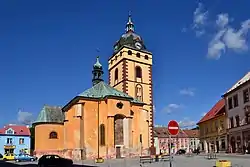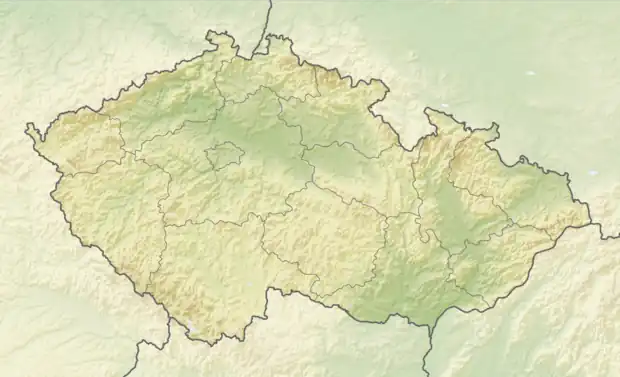Jirkov | |
|---|---|
 Church of Saint Giles and the Town Tower | |
 Flag  Coat of arms | |
 Jirkov Location in the Czech Republic | |
| Coordinates: 50°30′1″N 13°26′31″E / 50.50028°N 13.44194°E | |
| Country | |
| Region | Ústí nad Labem |
| District | Chomutov |
| First mentioned | 1321 |
| Government | |
| • Mayor | Dana Havlátková Jurštaková |
| Area | |
| • Total | 17.01 km2 (6.57 sq mi) |
| Elevation | 305 m (1,001 ft) |
| Population (2023-01-01)[1] | |
| • Total | 19,305 |
| • Density | 1,100/km2 (2,900/sq mi) |
| Time zone | UTC+1 (CET) |
| • Summer (DST) | UTC+2 (CEST) |
| Postal code | 431 11 |
| Website | www |
Jirkov (Czech pronunciation: [ˈjɪrkof]; German: Görkau) is a town in Chomutov District in the Ústí nad Labem Region of the Czech Republic. It has about 19,000 inhabitants. Jirkov creates a conurbation with Chomutov.
Administrative parts

Town parts and villages of Březenec, Červený Hrádek, Jindřišská and Vinařice are administrative parts of Jirkov.
Geography
Jirkov lies in close proximity to the city of Chomutov, with which it forms a conurbation. It is located about 44 km (27 mi) southwest of Ústí nad Labem. It lies on the border between the Most Basin and Ore Mountains. The highest point is at 590 m (1,940 ft) above sea level.The Bílina River flows through the town.
History
Jirkov was established as a colonization village on the Czech-Saxon border in the second half of the 13th century. The first written mention of Jirkov is from 1321 under the name Borek, the name Jirkov (that time written Jurkov) began to be used soon after.[2]
Until 1918, the town was part of the Austrian monarchy (Austria side after the compromise of 1867), in the Komotau (Chomutov) district, one of the 94 Bezirkshauptmannschaften in Bohemia.[3] From 1938 to 1945 it was one of the municipalities in Sudetenland. After the surrender of Germany, nearly all of the town's hitherto inhabitants were expelled, and new Czech settlers found a new home in the depopulated town.
Demographics
|
|
| ||||||||||||||||||||||||||||||||||||||||||||||||||||||
| Source: Censuses[4][5] | ||||||||||||||||||||||||||||||||||||||||||||||||||||||||
Transport
Jirkov is situated on the railway line Prague–Cheb of national significance, and on the regional railway line from Kadaň and Chomutov to Ústí nad Labem and Děčín.
Jirkov and neighbouring Chomutov together operate a transport company. In addition to buses, public transport is provided also by trolleybuses.
Sport
Every year the town organizes the Jirkov Crossmarathon and Half marathon. The tradition began in 2001.[6]
Sights
Červený Hrádek Castle

Červený Hrádek Castle (formerly Borek Castle) was founded by the Kraa family prior to 1415. The castle was sacked by the Hussites in 1421 and, after renovation later in the 15th century, the façade was painted red – hence the name Červený Hrádek (or Red Castle). In 1687 and 1688, the baroque sculptor Jan Brokoff carved statues, fountains and other works at the castle. His son Ferdinand Maxmilian Brokoff, also a sculptor, was born there.[7]
The last aristocratic family to own the castle were the Hohenlohe-Langenburgs. Max Egon Hohenlohe, the last owner, tried to prevent the occupation of Czechoslovakia by Nazi Germany through diplomatic negotiations when he allowed the meeting of the British mediator in the dispute between Germany and Czechoslovakia over the Sudetenland, Lord Runciman, with the leader of the Sudeten German Party, Konrad Henlein, at the castle in August 1938. After World War II, Prince Max Egon was expropriated by the communist government.[7][8]
Accessible areas of the castle include the castle's chapel, the hall of mirrors, the gallery and the study of Max Egon Hohenlohe.[7]
Town cellars
Long Cellar, also called Sand Cellar, was built in 1555. It was built for 40 years and it had 150 counters. Long Cellar served to the brewery and to a beer storage. Thanks to this, the beer was better. Beer was brewed in Jirkov from 1443. People brewed beer in the 16th and 17th centuries. A brewery was built near the cellar in 1841; thanks to this, Long Cellar lost importance.
Since 2006, the town cellars are accessible for visitors. Since 2011, the town cellars has been protected as a cultural monument.[9]
Church of Saint Giles
The oldest monument in Jirkov is the Church of Saint Giles. Its existence was mentioned already in 1300. It was newly built in 1568, the original parts of the building have been preserved.[10]
Notable people
- Ferdinand Brokoff (1688–1731), sculptor
- Augusta Rozsypalová (1857–1925), teacher and politician
- David Kämpf (born 1995), ice hockey player
Twin towns – sister cities
 Bátonyterenye, Hungary
Bátonyterenye, Hungary Brand-Erbisdorf, Germany
Brand-Erbisdorf, Germany Kobylnica, Poland
Kobylnica, Poland Šentjur, Slovenia
Šentjur, Slovenia
Gellary
References
- ↑ "Population of Municipalities – 1 January 2023". Czech Statistical Office. 2023-05-23.
- ↑ "Něco z historie" (in Czech). Statutární město Chomutov. Retrieved 2021-07-11.
- ↑ Die postalischen Abstempelungen auf den österreichischen Postwertzeichen-Ausgaben 1867, 1883 und 1890, Wilhelm Klein, 1967
- ↑ "Historický lexikon obcí České republiky 1869–2011 – Okres Chomutov" (in Czech). Czech Statistical Office. 2015-12-21. pp. 5–6.
- ↑ "Population Census 2021: Population by sex". Public Database. Czech Statistical Office. 2021-03-27.
- ↑ "Historie závodu" (in Czech). Město Jirkovský crossmarathon a půlmarathon. Retrieved 2022-09-13.
- 1 2 3 "Zámek Červený Hrádek" (in Czech). Město Jirkov. Retrieved 2021-07-11.
- ↑ Vyšný, Paul (2003). The Runciman Mission to Czechoslovakia, 1938: Prelude to Munich. Basingstoke, Hampshire: Palgrave Macmillan. pp. 215–217. ISBN 0-333-73136-0.
- ↑ "Městské sklepy" (in Czech). Město Jirkov. Retrieved 2021-07-11.
- ↑ "Děkanský kostel sv. Jiljí" (in Czech). Město Jirkov. Retrieved 2021-07-11.
- ↑ "Partnerská města" (in Czech). Město Jirkov. Retrieved 2022-09-22.
